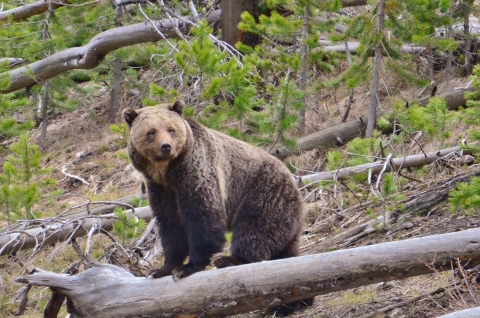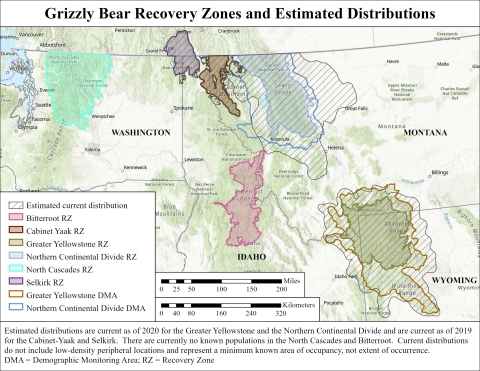DENVER — The U.S. Fish and Wildlife Service has completed the initial review of three petitions filed to remove the grizzly bear (Ursus arctos horribilis) in the lower 48 States from the list of endangered and threatened wildlife under the Endangered Species Act in certain ecosystems.
The Service finds two of these petitions present substantial information indicating the grizzly bear in the Northern Continental Divide Ecosystem (NCDE) and the Greater Yellowstone Ecosystem (GYE) may qualify as their own distinct population segment and may warrant removal from the list of endangered and threatened wildlife. The Service will now initiate a comprehensive status review of the grizzly bear in the NCDE and GYE based on the best available scientific and commercial data available to inform a 12-month finding. If those findings result in proposing one or more DPSs for delisting, the Service will consider those in the context of the ongoing recovery for the rest of the population in the larger listed entity.
The Service finds the third petition to remove ESA protections for the grizzly bear in the lower 48 states does not present substantial, credible information to warrant further action.
Grizzly bear recovery and conservation are complex issues, requiring coordination among federal agencies, states, Tribes, and other stakeholders. The Service appreciates the states historical commitments and partnerships to recover bears, particularly through conflict prevention efforts that have been effective in reducing human-caused mortality. However, the impact of recently enacted state laws and regulations affecting these two grizzly bear populations is of concern and needs to be evaluated. We will fully evaluate these and all other potential threats, and associated state regulatory mechanisms, in detail when we conduct the status assessments and make the 12-month findings.
Today’s announcement comes as the ESA turns 50 years old in 2023. Throughout the year, the Department of the Interior will celebrate the importance of the ESA in preventing the extinction of imperiled species, promoting the recovery of wildlife, and conserving the habitats upon which they depend. The ESA has been highly effective and credited with saving 99% of listed species from extinction. Thus far, more than 100 species of plants and animals have been delisted based on recovery or reclassified from endangered to threatened based on improved conservation status, and hundreds more species are stable or improving thanks to the collaborative actions of Tribes, federal agencies, state and local governments, conservation organizations and private citizens.
Substantial 90-day findings represent a relatively low bar, requiring only that the petitioner provide information that the petitioned action may be warranted. The next steps include an in-depth status review and analyses using the best available science and information to arrive at a 12-month finding on whether the removal of ESA protections for grizzly bears in the NCDE and GYE are warranted. If so, removing ESA protections would then be initiated through a separate rulemaking process, with additional public notice and comment.
The public can play an essential role by submitting relevant information, particularly new scientific and commercial data published since the 2021 5-year status review. This information will inform the in-depth status review and can be submitted through regulations.gov: Docket Number: FWS-R6-ES-2022-0150, beginning February 6, 2023, upon publication in the Federal Register and will include details on how to submit comments.
The 90-day finding and petition review forms associated with this announcement are now available for public inspection.
Visit the Service online to learn more about grizzly bears and the ESA petition process. Additional questions and answers can also be found on our website: Q&As: 90-day finding on grizzly bear petitions.





